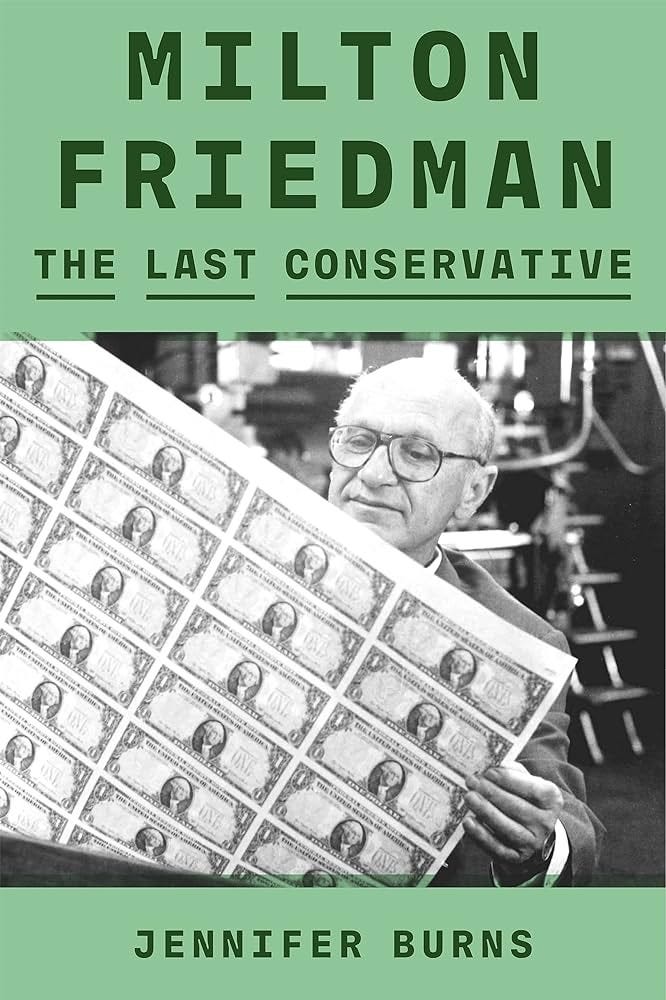I just finished Milton Friedman: The Last Conservative. I learned a ton. But the biggest lessons weren’t necessarily about his life. This book was an accidental crash course in the modern history of economic thought.
Milton Friedman was an intellectual giant. He passed nearly two decades ago, but for the decades before that, he had greater name recognition than any other economist.
A lot of policies on both sides of the political spectrum today can trace their genealogy to Friedman. The dream of Universal Basic Income (UBI)—and the realities of the Earned Income Tax Credit and the Child Tax Credit—go back to Friedman’s negative income tax. School choice—which is a hot issue where I live—was an idea first championed by Friedman. Even the importance of monetary policy in business cycles got most of its evidence from Friedman’s analysis A Monetary History of the United States.
And those policies don’t even highlight his contributions to economic theory and thought. Even his Nobel prize in economics underrates his contribution since his work easily could have won multiple prizes (following that pattern of the value of economic history).
Maybe Friedman accomplished all of this because he was a unique genius. But when we look at the time when he grew up, as this book does, we can see that he lived in a unique time. He was born in 1912, turning 18 just as the Great Depression started. This was one of the most important economic events in modern history—and it led many to question the role of government in the economy. Around the globe there was the serious debate (in stark contrast to today’s unserious debate around the internet) on whether the path to prosperity was better found in capitalism or communism. Later in life, he witnessed the highest inflation of the last century. At each step, he was listening to and engaging in debates on the biggest ideas.
And that’s what I loved so much about this book. Since Milton Friedman lived through and shaped so much of the development of modern economic thought, this book is like a crash course in the history of economic thought. From Keynesian institutionalists to the foundations of monetarism all the way through rational expectations, this is a nice primer on the evolution of macroeconomic theory. It doesn’t go into too much detail on any one line of thought outside Friedman’s, but I appreciated the summaries.
At the end, I wondered where today’s big economic debates are.
Recent economic thought
Maybe the global events of recent decades aren’t enough to stir the pot. Or they were settled. The Volcker Shock in the 1980s proved the power of monetary policy and the Fed. By 1990, we knew that communism had failed. The recession in 2008 created some intellectual questions, but the deft handling of the COVID pandemic shows we learned how to respond to emergencies (even if we overdid it on inflation).
The biggest shift in economic thought over this time period was the credibility revolution. Economists started thinking more carefully about identifying causal effects. And the debates around it have mostly been in the direction of making sure we improve the methodology. Sure, there are some people who feel like the old macro debates when they are debating about the value of RCTs, but I think those are mostly fights around the margins and not fundamental ideological disagreements.
Another debate that has developed over this period is the true gains from international trade. China’s entry to the World Trade Organization has led to a large shift in how people look at trade. Yes, we have seen the benefits from comparative advantage. But trade models assume that there are frictionless transitions to new industries. And we’ve seen a lot of frictions. So there has been some debate about economic liberalization, how much we should allow, how quickly it should unfold, and what support the government should give during the transition.
Perhaps we’re on the precipice of a new debate. AI is progressing rapidly, and there are potentially big consequences for the economy. Yet, overall, the debate has been mild. The US presidential election has almost entirely ignored it (Trump lists 20 policies on his platform, none of which mentions AI). Economists are paying attention to it, but I don’t know if we have a true ideology emerging yet.
Maybe we’re just too early. Maybe we’re on the cusp of seeing a new Milton Friedman, shaped by the technological progress banging down our door.





The debate about Say’s Law was replayed in the Great Depression and the Great Recession. The more things change….
The trade debate is a good example - I think it is still growing in terms of ideas/solutions.
Another topic I think we're seeing more discussions is the fiscal support on demand side that we saw during COVID vs the more supply side fiscal support during the great recession. This also plays into changing perspectives on how the Fed should optimally deal with inflation/employment trade off during major shocks.